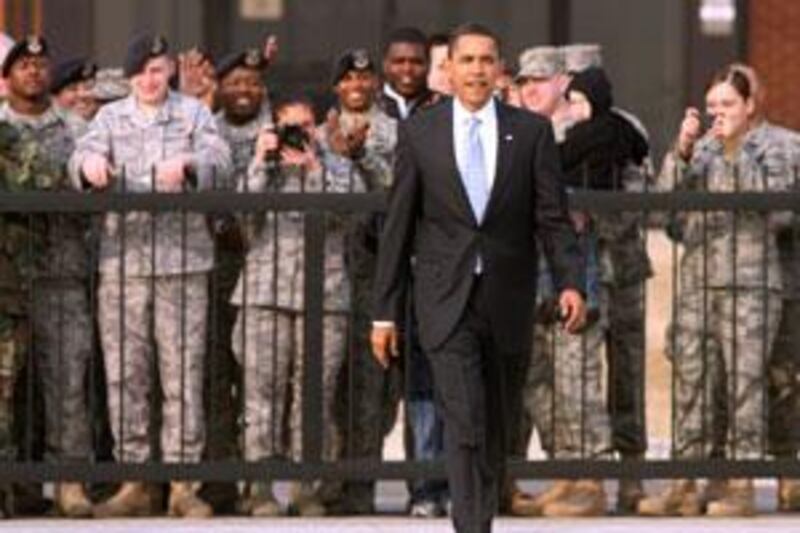WASHINGTON // While human rights groups and legal experts have mostly cheered Barack Obama's efforts to reverse Bush-era counterterrorism tactics, some are also beginning to question how much change they can realistically expect from the new president, who has signalled a willingness to stand by some of the controversial policies he once criticised on the campaign trail. On Monday, the Obama administration backed the Bush administration's arguments in legal action involving five US detainees who say they were sent to foreign prisons and tortured. A government lawyer, Douglas Letter, invoked the "state secrets privilege", claiming evidence in the case threatens national security. That is the same approach used by the Bush administration in 2007, when it blocked the case in a San Francisco district court.
The lawsuit, filed by the American Civil Liberties Union, alleges that a US company, Jeppesen Dataplan, a subsidiary of Boeing, arranged to have the detainees transported as part of the secretive US programme known as "extraordinary rendition". It alleges that the company knew the men would be tortured and that a senior official at the company referred to arranging "torture flights". Ben Wizner, the ACLU lawyer representing the detainees, said in a statement he was "shocked" and "disappointed" by what he called the administration's "dodging of judicial scrutiny". He quickly drew comparisons between the policies of Mr Obama and those of his Republican predecessor.
"This was an opportunity for the new administration to act on its condemnation of torture and rendition, but instead it has chosen to stay the course," he said. "This is not change. This is definitely more of the same," said Anthony Romero, the ACLU's executive director. "Candidate Obama ran on a platform that would reform the abuse of state secrets, but President Obama's justice department has disappointingly reneged on that important civil liberties issue."
No one is ready just yet to give up on the idea that the new president will effect sweeping changes in US counterterrorism policy. After all, Mr Obama is only beginning his third week in office and changing such deeply complicated policies takes time. But in the San Francisco court case many saw a first chance for Mr Obama to differentiate his approach from one that was shrouded in secrecy under Mr Bush.
Instead, some say, it has only become clear how difficult it will be for Mr Obama to make a clean break - or any break - on some of the legally and ethically complicated policies of his predecessor. "The Obama people have found that the rhetoric of the campaign has put them in an awkward situation of having to walk the cat back," said Edward Turzanski, a senior fellow of the Foreign Policy Research Institute, a conservative think tank in Philadelphia. "The reality of the situation is much more complex than his rhetoric allowed, and it turns out that the prior administration may have done the appropriate thing in terms of national security."
Mr Obama has already instituted some dramatic changes, including signing executive orders in the first days of his presidency that outlawed the most controversial interrogation practices and ordered the US detention centre at Guantanamo Bay, Cuba, closed within a year. But even as those directives have left important questions lingering. His executive order on interrogations, for example, while limiting interrogators to 19 non-coercive techniques listed in the Army Field Manual, also established a task force that could change the rules in the future. And despite his order to close Guantanamo, Mr Obama still has not answered the tough questions of what he will do with detainees deemed too dangerous to release, or how he will proceed with trials involving detainees who may have been tortured.
Mr Obama has also been somewhat ambiguous on his approach to renditions. Though he established a task force to ensure renditions "do not result in the transfer of individuals to other nations to face torture", he has not made clear what safeguards he intends to put in place. Leon Panetta, Mr Obama's pick to head the Central Intelligence Agency, said last week that the United States may continue to send detainees overseas for prosecution provided there are "assurances" they will not be tortured, but he likewise did not get into specifics.
Joanne Mariner, director of the terrorism and counterterrorism programme at Human Rights Watch in New York, said although answers to many tough questions remain "up in the air", it is still far too early to judge success of Mr Obama's counterterrorism reforms. "We're at less than one month into an administration. This is only the beginning," she said. Still she called the Obama administration's decision to invoke the state secrets privilege in the Jeppesen case "very disappointing".
Binyam Mohammed, the lead plaintiff in that case, was arrested in Pakistan in 2002 after a visit to Afghanistan. A legal resident of Britain, Mr Mohammed said he went to Afghanistan to escape a life of drugs. US authorities, however, suspected he was training with al Qa'eda and sent him to prison in Morocco, where he claims he was tortured. In 2004, he was transferred to a prison in Afghanistan, where he also claims to have been tortured. Later that year, he was moved to Guantanamo Bay, where he remains, on a hunger strike.
A justice department spokesman, Matt Miller, declined to comment on the case because it is ongoing, but he said the new administration will continue to invoke the state secrets privilege "in the most appropriate cases". He also said that Eric Holder, Mr Obama's new attorney general, ordered a full review of cases involving the state secrets privilege. "It is vital that we protect information that if released could jeopardise national security," Mr Miller said. "The justice department will ensure that the privilege is not invoked to hide from the American people information about their government's actions that they have a right to know."
@Email:sstanek@thenational.ae






